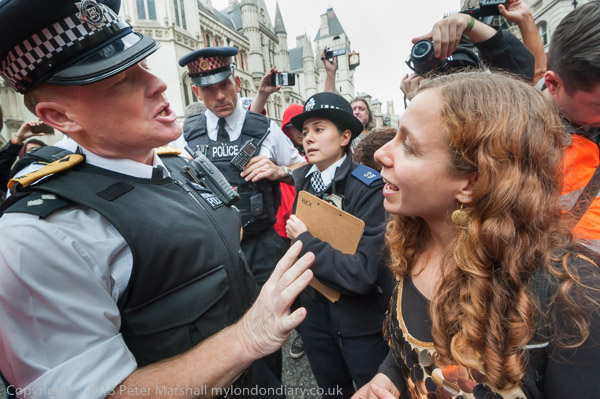
Police talks to a woman they have decided is in charge of the protest
The British legal system isn’t perfect, but in many ways is the best in the world, despite its faults. There are plenty of miscarriages of justice, some of which eventually are recognised, though many of these arise not from the legal system, but from corrupt policing, something that has been getting much public attention recently over a high profile and very minor cases such as ‘Plebgate’, but also over far more serious cases such as the inquests into the killing of Sean Rigg, Ian Tomlinson and Mark Duggan.
Of course many of us have been aware for a long time that our police at times embroidered the truth, planted evidence or simply told lies. It happened to some of my mates when I was still at school, to my friends at university and, years later a pair of officers threatened to fit me up when I argued with them over taking photographs.
One of the cornerstones of our legal system is legal aid. Again it isn’t perfect, but it goes some way to levelling the playing field, making it possible for those without means to fight their case. The law is still unequal, still ‘One law for the rich, and another for the poor‘ or even those on moderate incomes, but Legal Aid at least does something too redress that imbalance.
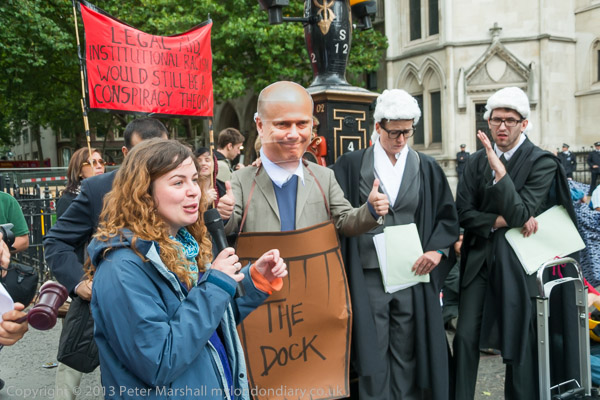
One banner on the protest read ‘Without Legal Aid, Institutional Racism would still be a Conspiracy Theory‘ and it is true that Legal Aid has done much to help challenge various inequalities. Which is perhaps why our current coalition government has set out to largely destroy the current system, wanting to replace it with a cut-price provision which will put many of the current providers out of business. It’s one of a whole batch of measures designed to reduce the possibilities of justice and of opposition to government plans being pushed through.
The details of the protest, organised by DPAC and UK Uncut were not made public in advance, with just a meeting place specified for the protest. That meeting place was the Central Criminal Court, the Old Bailey in the City of London. On a Saturday morning this is a largely deserted area, and it was clear that the protest was not going to take place there where it would affect and be seen by no one.
When I arrived it was also clear to me that few of the DPAC activists who I knew would be involved were present. I decided to look for them and thought of likely places in the vicinity and took a walk around, guessing that little would happen for at least half an hour.
At first I followed a protester in a wheelchair who was heading east, but it turned out they were just lost, and soon turned back towards the Old Bailey. Perhaps because it was fairly early on a Saturday morning I wasn’t thinking too clearly, and I was also misled again when one of the UK Uncut activists I know cycled past heading north.
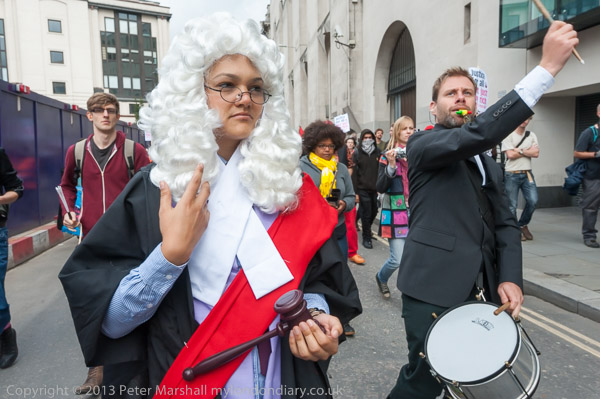
The march from the Old Bailey included a judge and a samba band
So I returned to the Old Bailey and joined the others waiting there, and before long we set off, going south, and then west. I took some pictures and then rushed ahead to the next point where I thought a protest was possible – but again there was no one there.
As the march started to go up Fleet St, my mind finally clicked back into gear, and having taken one or two pictures, I started to walk fast. One other photographer who had noticed me looking around earlier was with me, and we arrived just in time (well, 30 seconds earlier would have been a little better, but I didn’t want to run) to photograph the protesters bringing their wheelchairs onto the pedestrian crossing in front of the Royal Courts of Justice.
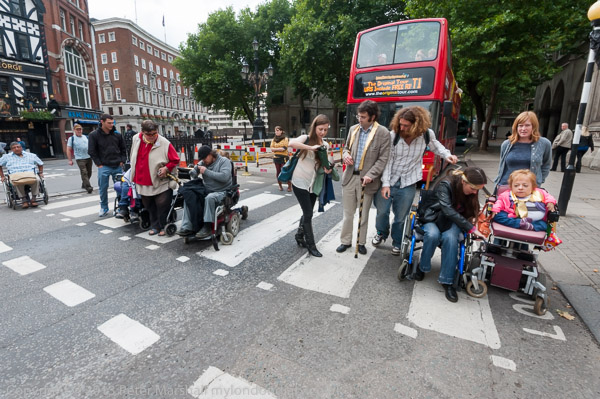
Wheelchairs move to block the road at the Royal Courts of Justice
The Strand isn’t the busiest of roads in London on a Saturday lunchtime, but has a significant amount of traffic both in cars and on foot, so the protest would be noticed, but it was obviously a very significant location for a protest about Legal Aid – and one that I kicked myself for not having realised earlier. But the two of us were still there well over a minute before the other photographers with the march realised what was happening. Thinking ahead really does give you and advantage.
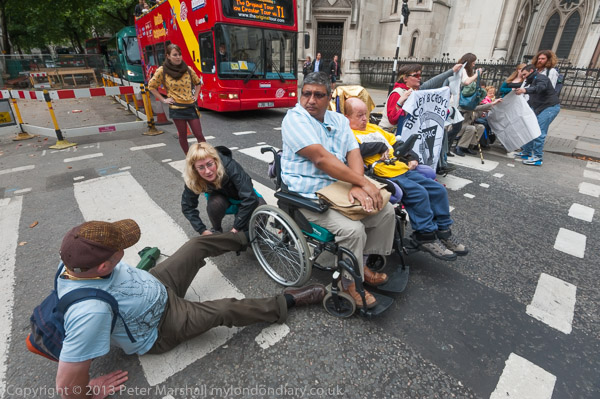
An able-bodied supporter gets locked on to one of the wheelchairs in the road block
I’d met the judge earlier at the Old Bailey, and outside the RCJ the rest of the legal team for the trial of ‘Ian Duncan Smith’ arrived, together with the defendant with the dock tied around his waist. He was duly tried with all those present being invited to be members of the jury. There was a break for a little entertainment before the trial ended with the unsurprising verdict and he was taken away, though only to the pub and not the prison he richly deserves.
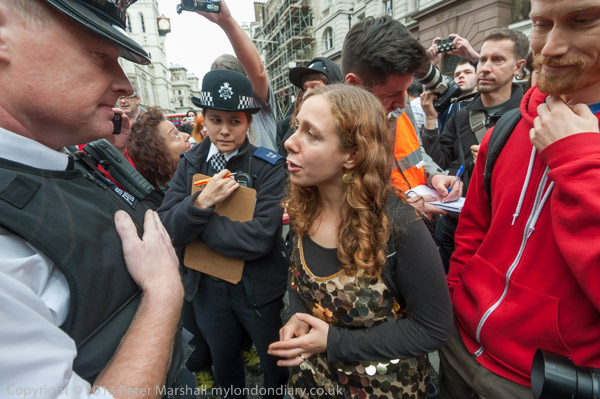
A protester replies to police who are trying to bring the protest to an end
Thinking ahead helped again later, when a police officer came to talk to a woman who he felt was in charge of the protest (though I’m not sure why he thought that, but police seem unable to think in non-heirarchical terms, perhaps because of the nature of their own organisation.)
Though this time it was only a matter of seconds, and as I saw him coming over and knew that something was likely to occur, I moved into the right place for when it did. I was just a little closer than I would have preferred, but in the middle of a crowd like this you don’t have any choice.
I don’t always get things right when I try to think ahead and anticipate what will happen next, but it often works out. It’s all too easy to get completely absorbed in what is happening now, and miss the start of the next phase of an event.
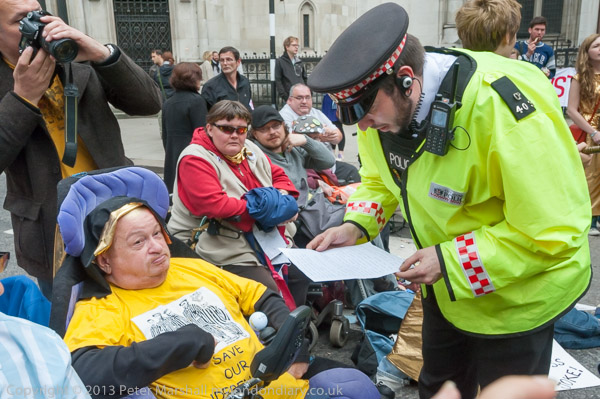
An officer reads his script to the wheelchair protesters
The police had been getting increasingly restive. Disabled protesters present them with something of a challenge, at least while the press are around, getting physical with them would certainly hit the front pages and be very bad publicity. And many police certainly sympathise with protests such as this, and are concerned to uphold the right to protest. They tried hard to persuade people who were sitting on the road to move, telling them they were breaking the law by obstructing the highway, and making threats of arrest. Eventually they came and read the same script to those in wheelchairs, and, after a short further protest and discussion, the disabled protesters came to the decision that they had made their point and it was time to go.
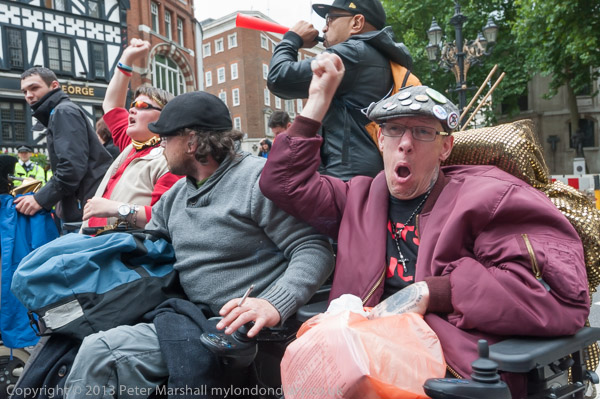
The protesters celebrate their success before leaving the road
After a final short celebration everyone left the road together after just over an hour and a half. You can see the rest of my images from the protest at UK Uncut Road Block for Legal Aid.
______________________________________________________
My London Diary : Buildings of London : River Lea/Lee Valley : London’s Industrial Heritage
All photographs on this and my other sites, unless otherwise stated, are taken by and copyright of Peter Marshall, and are available for reproduction or can be bought as prints.
To order prints or reproduce images
________________________________________________________